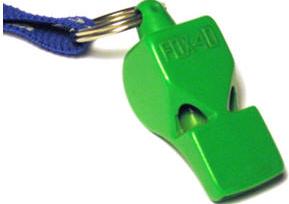|
|||||||||||||||||
|
|
|
|||
|
OSHA Issues Updated
Whistleblower Investigations Manual By Daniel Baxter |
||||
 |
September 21, 2011 - The Department of Labor's
Occupational Safety and Health Administration released a
new edition of its Whistleblower Investigations Manual,
one of a series of measures to improve OSHA's
Whistleblower Protection Program that were announced in
August.
A
whistleblower (whistle-blower or whistle blower) is a
person who tells the public or someone in authority
about alleged dishonest or illegal activities
(misconduct) occurring in a government department, a
public or private organization, or a company. The alleged misconduct may be classified in many ways; for example, a violation of a law, rule, regulation and/or a direct threat to public interest, such as fraud, health/safety violations, and corruption. |
|||
|
Whistleblowers may make their allegations internally (for
example, to other people within the accused organization) or
externally (to regulators, law enforcement agencies, to the
media or to groups concerned with the issues).
One of the
first laws that protected whistleblowers was the 1863 United
States False Claims Act (revised in 1986), which tried to combat
fraud by suppliers of the United States government during the
Civil War. The act encourages whistleblowers by promising them a
percentage of the money recovered or damages won by the
government and protects them from wrongful dismissal.
Whistleblowers frequently face reprisal, sometimes at the hands
of the organization or group which they have accused, sometimes
from related organizations, and sometimes under law. This new manual will provide further guidance to help ensure the consistency and quality of investigations. "The ability of workers to speak out and exercise their legal rights without fear of retaliation is crucial to many of the legal protections and safeguards that all Americans value," said OSHA Assistant Secretary Dr. David Michaels when these measures were announced in August. |
||||
|
Key changes to the
manual include a requirement that investigators make every attempt to
interview the complainant in all cases. Clarification that whistleblower
complaints under any statute may be filed orally or in writing, and in
any language, and that OSHA will be accepting electronically-filed
complaints on its Whistleblower Protection Program
website.
New chapters for
processing complaints filed under Federal Railroad Safety Act (FRSA), 49
U.S.C. ?20109, National Transit Systems Security Act (NTSSA), 6 U.S.C.
?1142, and Consumer Product Safety Improvement Act (CPSIA), 15 U.S.C.
?2087, as well as significant updates to the Surface Transportation
Assistance Act (STAA) and Sarbanes-Oxley chapters, which incorporate
statutory amendments and developments in the law. |
|
|
 |
| ?AvStop
Online Magazine
Contact
Us
Return To News
|
|

